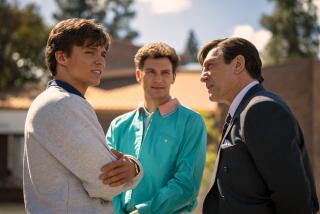On Their Own, Together
Dion Basco is talking about his latest audition for a TV series. It was uneventful and much like most other auditions he’s experienced in the past 10 years. Even as he speaks of running into his older brother, Derek, at the casting studio, he doesn’t blink an eye. By now, he’s accustomed to competing against hundreds of other actors--and his three brothers: “Yeah, we were both at the audition, no big deal,” he says.
“What audition?” yells brother Dante, slamming his fist down on their dining room table. For a moment, the three siblings, plus a fourth, Darion, sit stone silent. Within seconds, they burst into laughter.
“This is our life, right here,” Dante says.
Because of the scarcity of major roles available to Asian Americans in Hollywood, the four Filipino American brothers regularly compete against each other. During auditions for the 1996 film “Race the Sun,” the now-30-year-old Derek read for a supporting part. Casting directors liked what they saw, but asked if he had a younger brother. So, Darion, now 26, read for the part. He was told to call his younger brother, Dante, now 25. When Dante read, again the casting people wanted someone a little younger.
Dion, who is 24, landed the role: “Actually, the way I remember it, I just went in there and blew them away,” jokes Dion.
Only 2.6% of all roles in Hollywood went to Asian Americans in 2000, according to the Screen Actors Guild. Even more frustrating for those actors is that many of the roles written for Asian men tend to be in the category of martial arts fighters, gang members or socially inept, calculator-toting nerds. The Basco brothers are all good-looking, appealing men. With dark skin, chiseled facial features and thick, black hair, they don’t fit into the geek category.
“To tell you the truth, we don’t get cast in many of those stereotypical Asian roles because we walk into a room and the casting director will say, ‘Whoa, this is too much for an Asian guy role; you’re not supposed to be turned on by an Asian guy,’” Darion says.
“And if they do take the risk and cast us into those roles, suddenly the role is something totally different. So we can keep our integrity that way as artists.”
The brothers have appeared in several major film and television productions. Dante has worked more than the others, probably because he scored the role of Rufio in Steven Spielberg’s “Hook” (1991) when he was just 15. He’s also had lead roles in films such as “Extreme Days” (2001) and “But I’m a Cheerleader” (2000). Still, Derek appeared last season as Jack’s flavor-of-the-week, Mipanko, in a “Will & Grace” episode and had a recurring role on “Becker.” Dion just came off a five-year run as a regular on the NBC Saturday-morning comedy “City Guys.”
Darion also has had his fair share of work, including the indie film “Hundred Percent” (1998), and roles on “ER” and “Chicago Hope.” Their work has attracted the attention of some Hollywood executives, including Quan Phung, director of comedy development for Fox Broadcasting Co.
“Dante’s known in the independent film world. Dion and Derek have gotten kudos for their comedic work. And Darion’s doing great dramatic pieces. They are still young, but I can imagine a scenario where their careers develop in the same way the Wayans brothers’ careers developed, where they can succeed individually or working with each other,” Phung says.
Last year, the brothers acted together for the first time in “The Debut,” a coming-of-age comedy about a young Filipino American boy coming to terms with his cultural identity.
The movie, directed by first-timer Gene Cajayon, was marketed to an Asian American audience. Although the Basco brothers cite their performances in “The Debut” as some of their best work, they were disappointed that the film, which was shown at a couple of festivals and in rented theaters, didn’t gain theatrical distribution to a broader audience.
“Of course, we are the actors in the film, not the director or producer, so it wasn’t really up to us on how to best release the film,” Derek says, “but we learned a lot and now we can apply those lessons to our own project.”
For the past several months, the Bascos have been working on their first feature film as a group, “Naked Brown Men,” written by Derek and fellow actor Adam G. Adam, who is half Jamaican, half white, grew up with the brothers, and is often called the fifth Basco by family and friends.
The group hired director Bob Bryan, best known for his documentary series “Graffiti Verite,” and spent 30 days filming “Naked Brown Men” in the Laurel Canyon home shared by Dion, Dante, Darion and Adam.
The film blurs the line between fact and fiction. The story is about four actor brothers who compete for the same roles and sometimes the same women. Although it is a comedy, the script delves into issues the brothers have had with one another for many years but have rarely, if ever, talked about. Many scenes proved difficult, especially for Darion and Dante, who are the two closest in age and the most competitive in real life. Some days, according to Darion, were emotionally and physically draining.
“On the last day of rehearsal, Dante and I had to confront each other on something that we’ve never talked about. I can’t say what it is because it would give away the scene in the movie. We both got sick, we threw up after that, and we were both a little sick during the whole shooting of the movie,” Darion says.
A story that has become family folklore is one of Dante and Darion as children, battling over a trophy in karate class.
Although the master asked that one bow out to avoid two brothers fighting, they insisted on competing. The match was close until the end, when Darion jumped up and kicked his brother in the face, knocking him to the floor.
Darion thought this meant a win, but the instructor disqualified him and Dante won the prize.
“To this day, Darion thinks he won and so does Dante,” says director Bryan. “It’s an old story now and they love each other no doubt, but there is a lot of jealousy over that love that was confronted in this movie.”
The Bascos put every last penny of their money and some borrowed from friends into “Naked Brown Men.”
Their dedication to the project is the result of years of hard work, frustration, rejection and a strong work ethic: “We still have to work parking cars or catering parties because we have to supplement our income so we can remain sane and have a career and lifestyle that we can actually live with,” Darion says.
The brothers started their careers in Pittsburg, Calif., a small suburb of San Francisco. Their mother, afraid her children might be lured into local gangs, enrolled them in dance classes. Soon enough, the boys were break-dancing their way through various competitions and showcases. When the brothers expressed an interest in acting, their mother packed up a van and drove them to Los Angeles. The family stayed in a tiny La Palma apartment, and their father, who had to stay behind to work in the Bay Area, would visit on weekends.
Eventually, with Dante’s TV commercial and “Hook” success, the family, including Dad, moved to a home in Paramount. It was there that the Bascos picked up street slang and a love of basketball.
This part of their persona has caused some friction between the brothers and their Asian American fans. Some accuse the brothers of “acting black” and claim they are ignoring their heritage. The brothers perform together in a hip-hop group, Fly Brown Dragons, and although they’ve performed at the Whisky and the Coconut Teaszer in Los Angeles, their “black” rap style sparks negative reactions from some Asian Americans.
Dion lets the criticism slide: “When I first started hearing this stuff, it hurt a little bit. But I’ve come to realize that we’re artists, and we put ourselves out there every day, and we can’t please everybody. We have the best intentions and we believe in our work, and that’s what matters.”
Their family has other issues. Although their mother helped get them into the field, the Bascos’ lack of major success has put a strain on the relationship: “Our mom, aunts and uncles don’t understand our lifestyle of not having a steady paycheck or dumping thousands of dollars into our movie,” Derek says.
Emily Cho, a talent and literary manager at the firm Dayton-Milrad-Cho, says: “They’re such a tight-knit group, the four of them, I’ve never seen anything like it. And that is the epitome of family; they have each others’ backs and there is a fierce loyalty there,” says Cho, who is Derek’s wife.
Adds Derek: “We will resolve the issues we have with our family, but in the meantime this is our family--us and our tight-knit circle of friends.”
It is precisely this attitude that has allowed the Basco brothers to persevere; at the end of a tough day of competition, they can still sit down and eat dinner together.
At the moment, their primary concern is editing and finding distribution for “Naked Brown Men.” Although they are excited about its potential, they try to remain realistic. “My biggest hope is that everyone gets to see this movie,” Dante says. “As for my biggest fear? I don’t have any fear. After everything we’ve been through, there’s no more fear because I know what we did. We’re already in motion as artists.”
*
Clare Kleinedler is the music editor for Wired magazine.


